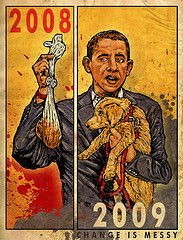North Korea called Hillary an "unintelligent, funny lady" and in typical fashion, Ms. Clinton warned North Korea they would soon be "without friends".
Sticks and stones may break my bones...
The Washington Post reports more:
PHUKET, Thailand, July 23 -- The war of words between North Korea and the United States escalated Thursday, with North Korea's Foreign Ministry lashing out at Secretary of State Hillary Rodham Clinton in unusually personal terms for "vulgar remarks" that it said demonstrated "she is by no means intelligent."
Clinton, who this week likened North Korea to an unruly child, has rallied international isolation of North Korea at a 27-member regional security forum here. She met with her Russian, Chinese, South Korean and Japanese counterparts -- the other key partners in suspended six-nation disarmament talks on North Korea -- and won strong statements of support from many delegations.
On Wednesday night, she even sent a delegation of U.S. officials to meet with diplomats from Burma, which has strained relations with Washington, to press for compliance with a U.N. Security Council resolution barring exports of North Korean arms and missiles. The resolution was passed this year after North Korea detonated a second nuclear device, and Burma announced Thursday that it would comply with it.
"There is no place to go for North Korea," Clinton told reporters after reading a nearly seven-minute statement outlining U.S. policy on North Korea. "They have no friends left."
North Korean officials also are attending the conference hosted by the Association of Southeast Asian Nations on this resort island. In a comical scene, North Korean officials showed up at a news conference venue that had been set up for Clinton, who as usual was running late. Although the North Koreans had booked the space, they retreated to a nearby hallway to meet with reporters and denounce the United States.
"The six-party talks are over," spokesman Ri Hung Sik said, because of the "deep-rooted anti-North Korean policy" of the United States. North Korea rarely holds media events, so the decision to speak to reporters was significant.
Clinton and other U.S. officials said the North Korean delegation made similar belligerent statements at the conference. "In their presentation today, they evinced no willingness to pursue the path of denuclearization, and that was troubling," Clinton said.
The Foreign Ministry statement attacking Clinton also amply demonstrated the North Korean mood.
"We cannot but regard Mrs. Clinton as a funny lady as she likes to utter such rhetoric, unaware of the elementary etiquette in the international community," a Foreign Ministry spokesman said, according to North Korean media. "Sometimes she looks like a primary schoolgirl and sometimes a pensioner going shopping."
The fit of pique was apparently inspired by an interview Clinton gave ABC News while visiting New Delhi this week.
"What we've seen is this constant demand for attention," Clinton said. "And maybe it's the mother in me or the experience that I've had with small children and unruly teenagers and people who are demanding attention -- don't give it to them, they don't deserve it, they are acting out."
The Obama administration came into office with hopes that it could restart the talks that broke down in the final days of the Bush administration. President George W. Bush, who had originally taken a hard line, made substantial concessions to Pyongyang after it first tested a nuclear weapon in 2006. Last year, he removed North Korea from the list of state sponsors of terrorism, but the talks faltered nonetheless.
President Obama appointed a special envoy for negotiations with the hope of rebuilding the process. But after North Korea tested ballistic missiles and a nuclear weapon, the Obama team shifted course, viewing North Korea as a test case to demonstrate that substantial sanctions could be imposed on nuclear rogues while still holding out the promise of a better relationship. The administration even resurrected a demand for "irreversible" steps on denuclearization, language that had been banned by the State Department toward the end of Bush's term.
Thus far the effort appears to have won some cooperation from previous skeptics such as China.
Michael J. Green, the former top Asia adviser to Bush, said Clinton's statement was "a comprehensive and well-balanced statement of North Korea strategy," noting that she also highlighted human rights abuses by North Korea and said she would name a special human rights envoy for North Korea. "The inclusion of human rights issues is important and striking, given some of the administration's recent hesitation about raising these issues around the world," he said.
Javier Solana, the European Union's foreign policy chief, told reporters that, despite the angry back-and-forth, he did not think the six-party talks were over and that North Korea eventually would return to the bargaining table.
The Obama administration, however, insists it will not drop the sanctions, as Bush did, to win Pyongyang's cooperation.
"We are open to talks with North Korea. But we are not interested in half-measures," Clinton said. "We do not intend to reward the North just for returning to the table."


No comments:
Post a Comment